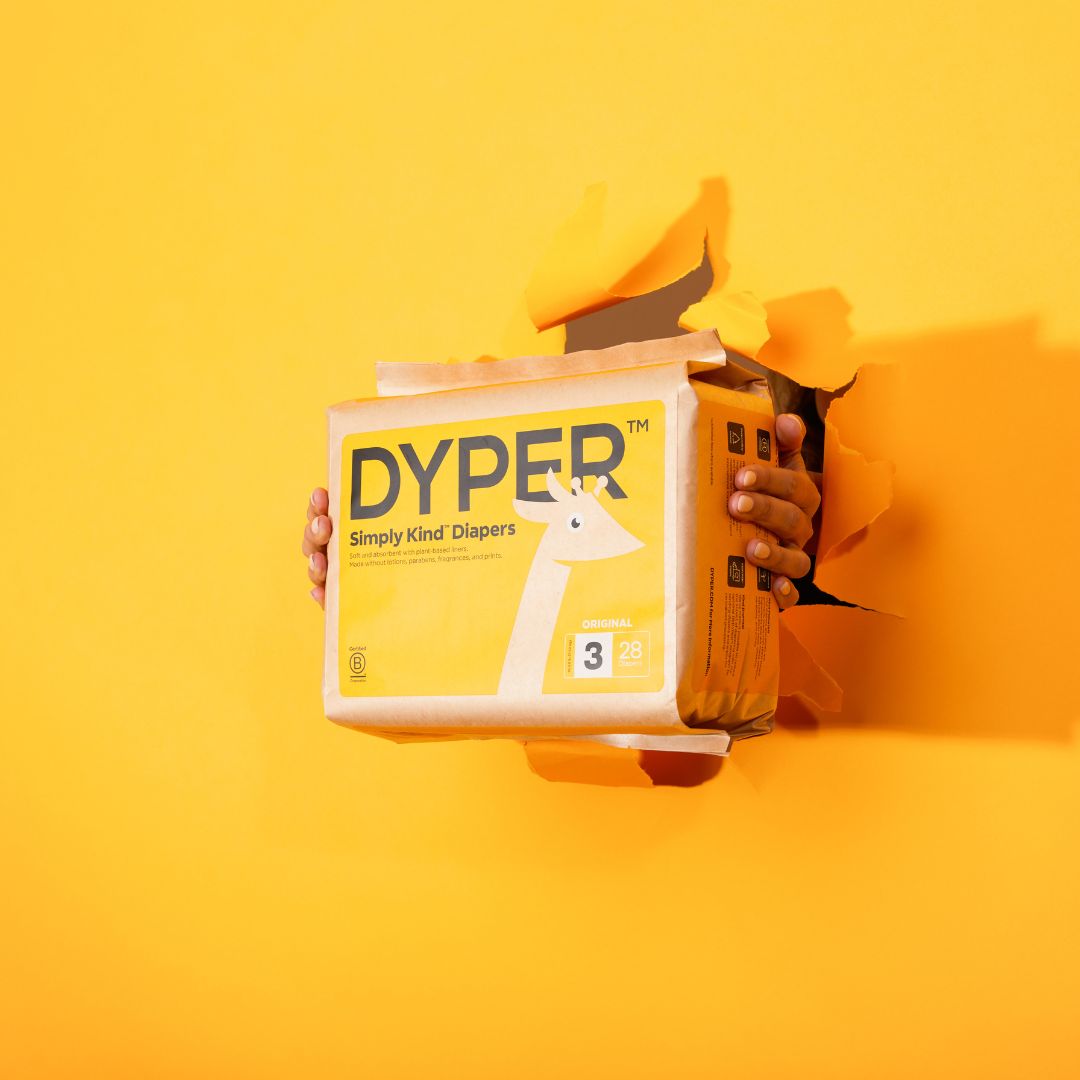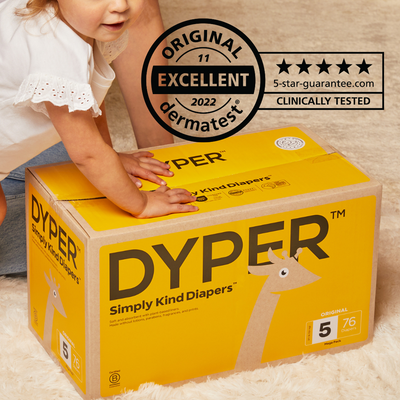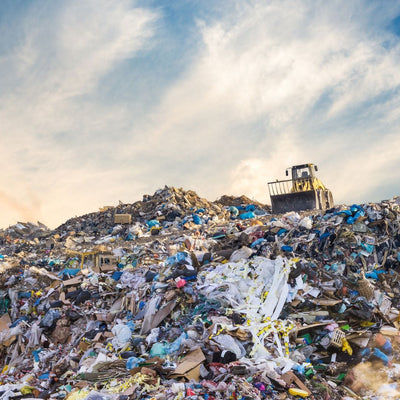What makes a disposable diaper truly environmentally responsible? At DYPER, we have gone the extra mile to ensure that your diapering journey is kind. Here is how we do it!
The Truth About Compostable Diapers
Most disposable diapers are conventional, filled with plastic and harsh chemicals. Even the majority of plant-based diapers end up in landfills since many manufacturers do not offer a safe commercial composting solution like REDYPER™. And, once diapers are in landfill sites, environmentally responsible or not, they pose an environmental impact.
To manage the spread of disease and odor and air emissions, these landfills are covered with soil daily or weekly. However, this also means that the disposal of diapers is no longer exposed to the sunlight and air they require to breakdown. Because of this, it can take up to 500 years for a disposable diaper to break down.
Additionally, disposable diapers have a significant impact on ozone depletion. This is because chlorofluorocarbons (CFCs) are released as they break down in a landfill site. Even more sustainable, plant-based diapers that are free from harsh chemicals will take much longer to break down in the dark, suffocating environment of a landfill. And, because the decomposition is taking place anaerobically (in other words, without oxygen), it will also result in the formation of harmful gases such as methane. Methane is twenty-three times more damaging than carbon dioxide (CO₂).
Divert Diapers from Landfill Sites
Because we are obsessed with manufacturing a environmentally responsible diaper, we have created REDYPER™. When you subscribe to the REDYPER™ program, you will receive the bags, and boxes to safely transport your used diapers to a specialized composting facility. And don't worry about any mishaps in transit! Our boxes are constructed to the strictest United Nations Hazardous Materials shipping standards.
The resultant compost is used for special projects such as the revegetation of highway medians. So, you can rest easy in the knowledge that your baby diapers are not ending up in a landfill. Instead, they are being meticulously composted and subsequently put to meaningful use.
What Does Carbon Neutral Mean?
Carbon neutrality refers to the balance of the number of greenhouse gases produced versus those taken out of the atmosphere. For a company to be carbon neutral, the volume of greenhouse gases produced minus the volume of these gases removed from the atmosphere should be zero. Obviously, a carbon-neutral product or service is better for the environment. But how can a company achieve a zero CO₂ footprint? The most efficient way to do this is to reduce the emission of CO₂ and greenhouse gases in the first place. In cases where this is not possible, companies can purchase Carbon Offsets to balance out the equation.
Reduce When You Can, Offset When You Can't
With every delivery, DYPER purchases 18.3 kg Carbon Offsets to compensate for the emissions resulting from the manufacture and delivery of our diapers. To manage our carbon-neutral program and provide the carbon offsets following supervised protocols, DYPER has partnered with Cool Effect. DYPER carbon offsets support the Alto Mayo Reforestation Project. This project combats the deforestation of 450 000 acres of tropical rainforest in Peru. Ensuring the natural sequestration of carbon dioxide as well as the protection of hundreds of unique plant and bird species.
Let's Talk About Plastics
Did you know that each conventional disposable diaper comprises between 22 and 23 grams of plastic? That is a little more than the equivalent of two plastic water bottles worth of plastic! The average baby wears eight to ten diapers per day. So 176 grams of plastic, or sixteen plus water bottles, worth of plastic discarded per baby per day. Can you imagine what that number would look like taken over the entire diaper-wearing lifetime of one child?
That is not all. The plastics used in the manufacture of conventional diapers are usually petroleum-based. In other words, made from crude oil. Pollutants released during plastic production processes include ethylene oxide, methanol, nitrous oxides, and sulfur oxides.
DYPER diapers contain bio-plastics and the total content of plastic in our diapers is 6 grams. What are bioplastics? Bio-based plastics are plastic-like materials manufactured from natural raw materials such as cane sugar, corn, or potatoes. The great thing about bio-plastics? The CO₂ released during their decomposition is balanced by the CO₂ uptake of the plants that they were made from.
What's Inside That Absorbent Core?
The most vital performance component of a throwaway diaper is the absorbent core. Most disposable diapers comprise a super absorbent polymer (SAP) encased in some sort of wood pulp. The environmental significance of this wood pulp is two-fold. Firstly, where is the wood pulp sourced from? Are you looking for the most environmentally responsible disposable diaper option? Make sure that this wood pulp originates from responsible-managed forests.
Another point to consider: To improve the look and absorbency of this wood pulp, many diaper manufacturers will put it through a bleaching process. This process usually makes use of elemental chlorine, resulting in the formation of dioxins. Dioxins are known carcinogens and are touted to be of the most toxic chemicals known to science. When looking for a responsible diaper that is safe for your baby, look for wood pulp bleached using elemental chlorine-free (ECF) or total chlorine-free (TCF) techniques.
Check for Certifications
More and more parents are becoming aware of the impacts of their purchasing choices on the planet. They are taking ownership of those decisions by choosing responsibly manufactured products that are less harmful to the environment. With that, there has been considerable growth in the baby-safe and environmentally friendly diapers market. Unfortunately, in the US, the manufacturing of disposable diapers is loosely regulated. So, companies may make several claims without them being substantiated.
For confidence in a company's claims on the safety and responsibility of its products, look for third-party testing and certification.
DYPER diapers are certified by OEKO TEX, an independent Swiss testing body. Our baby diapers have achieved Standard 100, the highest safety rating for baby products! DYPER disposables are manufactured with plant-based and responsibly sourced materials that are certified OK biobased. DYPER diapers have also undergone ISO (International Organization for Standardization) testing to determine the ultimate aerobic biodegradability of the plastic materials in our products.
Kind for Baby and Kind for the Planet
For your peace of mind, DYPER disposable diapers are made without harmful materials. There are also no lotions, fragrances, phthalates, or anti-oxidants or present in the diapers. Plant-based goodness means soft on your baby's delicate skin is cossetted in a diaper that is absorbent and kind.
Choose a Kind Diapering Journey
On average, one child will wear between 7300 and 9200 disposable diapers in their lifetime (8-10 changes per day over two and a half years). That is the equivalent of almost one ton of waste generated by the time a child reaches potty training age. Disposable diapers have caused an enormous end-of-life diapering problem. Be a part of the solution. Rather than adding to our planet's already burgeoning waste problem, choose to join the REDYPER™ program. Your child's diapers can be turned into something useful and regenerative.
Not only does DYPER deliver plant-based, soft, and absorbent diapers to your door. To reduce the CO₂ footprint, we purchase carbon offsets for each delivery made. Another way that we make your choice of baby diaper kind!






